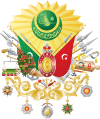Musa Çelebi
This article needs additional citations for verification. (February 2013) |
| Mûsâ Çelebi | |
|---|---|
 Musa by Paolo Veronese, 16th century | |
| Sultan of the Ottoman Empire (de facto) | |
| Reign | 17 February 1411[1] − 5 July 1413 |
| Predecessor | Süleyman Çelebi (de facto) |
| Successor | Mehmed I |
| Died | 5 July 1413 Çamurlu (near Samokov) |
| Burial | Sultan Murad Hüdavendigar Complex, Osmangazi, Bursa Province, Turkey |
| Father | Bayezid I |
| Mother | Unknown |
| Religion | Sunni Islam |
Mûsâ Çelebi (fl. 1402–5 July 1413) was an Ottoman prince (Turkish: şehzade) and a co-ruler of the empire for three years during the Ottoman Interregnum.
Background
Musa was one of the sons of
Ottoman Interregnum
İsa defeated Musa and captured Bursa. Musa took refuge in
As a co-sultan

The details of the previous Mehmed–Musa alliance are not clear. Musa declared himself the sultan of the European portion of the empire, while Mehmed viewed Musa as his vassal. Musa besieged Byzantine Constantinople (modern Istanbul) as retribution for Manuel II Palaiologos's support for Süleyman during the previous battles between Musa and Süleyman. Manuel II Palaiologos turned to Mehmed for support, who betrayed Musa and set up a new alliance between himself and the Byzantines against Musa.
In 1411 and in 1412, Mehmed's forces clashed with Musa's, and in both cases Mehmed was defeated. In 1413, Mehmed gained the support of
Aftermath

Musa's death ended the Ottoman Interregnum. His brother Mehmed Çelebi became
Family
Musa married two times:
- Arina of Wallachia,Mircea I of Wallachia, married in 1403;
- A daughter of Carlo I Tocco, married in 1412;
References
- TDV Encyclopedia of Islam (44+2 vols.) (in Turkish). Istanbul: Turkiye Diyanet Foundation, Centre for Islamic Studies. 1988–2016.
- ^ ISBN 978-90-04-15836-8
- ^ a b Encyclopædia Britannica Evpo 70 ed., Vol. 22, p. 368
- ^ Prof. Yaşar Yüce-Prof. Ali Sevim: Türkiye tarihi Cilt II, AKDTYKTTK Yayınları, İstanbul, 1991 pp. 74–75
- ^ Joseph von Hammer: Osmanlı Tarihi cilt I (condensation: Abdülkadir Karahan), Milliyet yayınları, İstanbul. pp. 58–60.
- ^ Encyclopedia of Islam, Vol. 7, Ed. C.E. Bosworth, E. Van Donzel, W.P. Heinrichs and CH. Pellat, (E.J. Brill, 1993), 699.
- ^ Tiuliumeanu, Mihai (18 October 2019). Tiuliumeanu, Mihai; Ariton, Nicolae C. (eds.). "Musa, fiul lui Baiazid, II" [Musa, the son of Baiazid, II]. Misterele Dunării (in Romanian). Vol. 3, no. 10. Misterele Dunării. Retrieved 4 December 2023.

